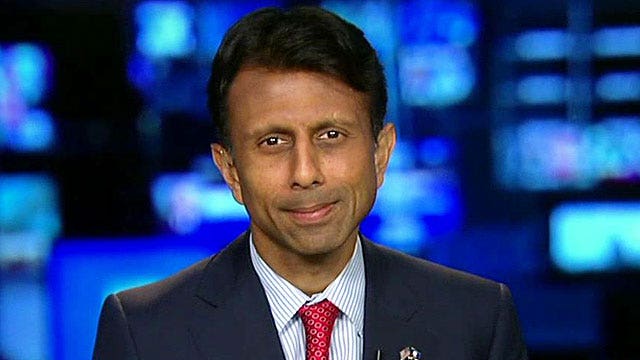Jindal on why Obama refuses to acknowledge radical Islam
Louisiana governor discusses controversial prayer breakfast remarks
Louisiana Gov. Bobby Jindal has unveiled a 42-page proposal to reform American education at the national level, one of the clearest signs yet that he is laying the groundwork to jump into the 2016 presidential primary.
At the heart of his proposal is a total repudiation of Common Core, as well as a general rollback of federal authority, increased school choice options for parents and greater administrative freedom for educators.
Jindal revealed his plan at a breakfast Monday morning hosted by the Christian Science Monitor. The actual proposal takes the form of a policy paper released through America Next, Jindal’s nonprofit think tank. It follows several similar proposals Jindal has made on foreign policy, energy and other major topics. However, the education proposal stands out from the pack, thanks to the governor’s growing status as one of the most savage critics of Common Core.
While Jindal supported the English and math standards just a few years ago, he has changed his mind and been attacking them constantly since last spring, when he gave a speech comparing them to policies in the Soviet Union.
Jindal has been battling his own school superintendent and state school board for over half a year in an effort to force Louisiana off the standards. He has also filed a lawsuit against the federal government, claiming that Common Core is an illegal federal intrusion into state sovereignty.
Accordingly, in Jindal’s plan, he proposes to “repeal Common Core and restore state and local standards.” He accuses “central planners” in the federal government of creating a de facto national curriculum “through deception” by having the standards crafted by several non-profits rather than by Department of Education apparatchiks.
Dumping the Core, Jindal argues, is a key component of strengthening the rest of his proposals, including the expansion of charter schools and voucher programs, granting teachers more leeway in the classroom and preventing other kinds of federal meddling in local affairs.
Michael Brickman, national policy director at the center-right education think tank Thomas B. Fordham Institute, gave his approval of many of Jindal’s proposals to roll back federal power and increase school choice. However, Brickman also said that Jindal’s focus on Common Core was strange and led to nonsensical policy proposals.
“He contradicts himself, by saying nobody other than individual states should be determining what standards are in place, yet he says we should repeal Common Core. I’m not even sure what that means,” said Brickman. “What would you even do [federally] to repeal Common Core?”
While the federal government has offered some incentives to adopt Common Core through programs like Race to the Top, Brickman said, it is still purely a state choice whether or not to adopt the standards, and several states have chosen to stay out.
“They’re not federal standards. If they were, they’d be in all 50 states,” Brickman said.
While Brickman was critical of Jindal’s Common Core proposals, he said the rest of the plan has plenty to like.
“There’s definitely a lot of good discussion in there about school choice and other issues,” he said.
Some of Jindal’s other suggestions include big changes to the teaching profession by weakening unions, giving schools greater leeway to experiment with whom they hire and how they teach and most notably, eliminating teacher tenure.
“For most of us, the idea that we could never be fired regardless of whether we did our jobs well, or even did our jobs at all, would strike us as absurd,” the proposal says.





